
Latest news
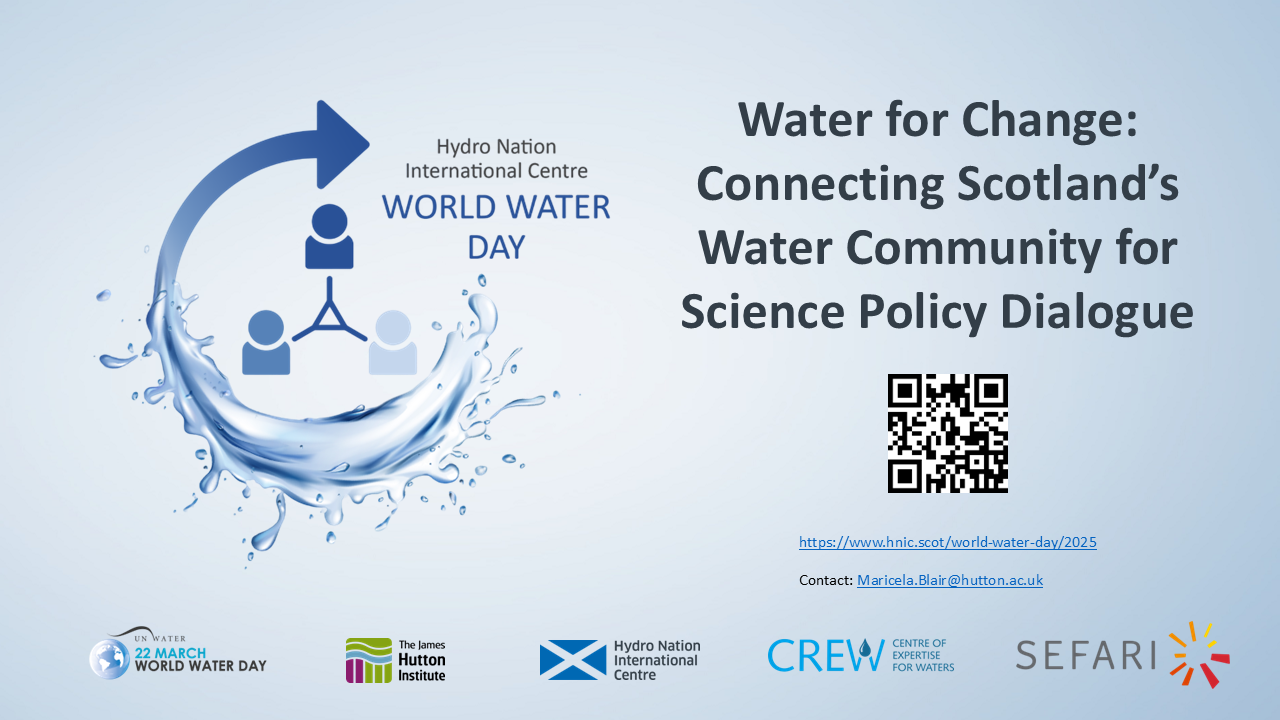
The Hydro Nation International Centre (HNIC) alongside the Strategic Research Programme (SRP) including CREW and wider initiatives like HNSP, and with funding from SEFARI Gateway is acknowledging World Water Day 2025 by coordinating a dedicated webpage to connect to water-related events and activities being led and organised by the water community across Scotland and showcase key resources and updates under the theme Water for Change: Connecting Scotland’s Water Community for Science-Policy Dialogue.
This webpage serves as a hub for events, audiovisual content, and key resources.
There will be ongoing updates throughout the week so there is still time to contribute resources to showcase water-related activities and events. To do so, please contact Maricela Blair (Maricela.Blair@hutton.ac.uk)
Join us in celebrating #WorldWaterDay 2025! Explore more: hnic.scot/world-water-day/2025
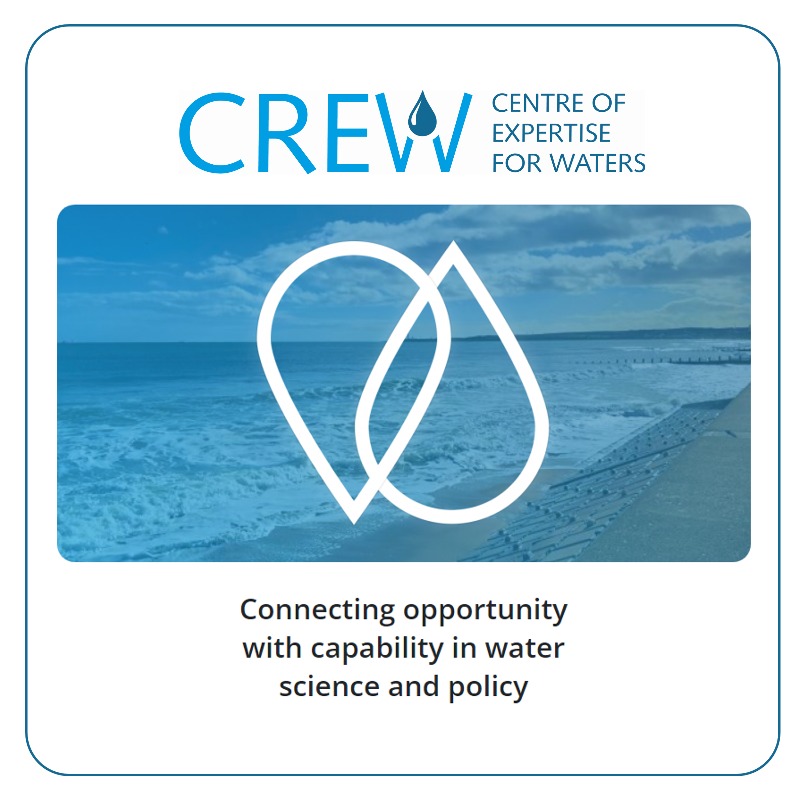
Connecting opportunity and capability in water science and policy
Visit register.crew.ac.uk
• Connect to opportunities
• Reach out to colleagues and share your work
• Explore skills and find solutions
• Widen your network
CREW's water sector Register of Expertise was launched on World Water Day March 22nd 2023.
Learn all about it here!
Aim: The Register of Expertise aims to:
- support colleagues in the Scottish water community access information on water experts and expertise;
- provide a platform to increase visibility and interconnectedness when searching for new project consortia and wider collaborations; and
- facilitate a network of expertise from academia, industry, regulation, and policy.
Development: The project was announced at a CREW engagement workshop with Higher Education Institutes and Research Institutes, and suggestions and feedback was taken on board. A scoping study reviewed the evidence base on contemporary research taxonomies, related methodologies and technical characteristics and functionality of a range of online expert-finding systems.
Find an Expert: The Register of Expertise contains information on who relevant experts are, where they are working, what role, research expertise, experience, and skills they possess and how they contribute to CREW projects and Scotland’s science: policy interface on water. Search by (a combination of) Geographical region of research operations, specialist areas, environmental sector, discipline, technology, role or by name!
Register: Researchers and practitioners alike can register in seven steps from a mobile phone or computer. Accounts are verified by the CREW team, then users can complete their profiles and update them at any time. Users can also link to their existing profiles and identifiers (e.g., LinkedIn, ResearchGate, Orchid) and reference key CREW publications and wider outputs.
If you have any queries about the Register, please email RoECoordinator@crew.ac.uk

The Hydro Nation Scholarship Programme is thrilled to announce that its Call for Proposals 2024 has been opened and eligible applicants are invited to submit their project proposals until 4th September 2023 on the following topics:
Resource Recovery
Hydrogen Economy
Place-Based Innovation
Managing Water Services
Pollution Mitigation
The Hydro Nation Scholars programme is an open competition for PhD scholars to undertake approved projects hosted within Scottish Universities and Research Institutes. The programme is supported by the Scottish Government and managed by the Hydro Nation International Centre at the James Hutton Institute.
For more information and to apply: visit https://www.hydronationscholars.scot/apply
Read more about past and current scholars and projects here.

Celebrate World Water Day on Wednesday 22nd March 2023.
We explore the theme, Accelerating change through Partnerships and Cooperation'.
The full programme of presentations and sessions is now available to read here.
This free hybrid event is hosted by the Hydro Nation International Centre at the Edinburgh International Conference Centre (EICC), with live stream and is supported by
the Scottish Government and the James Hutton Institute.
Evening Event: Scotland's Centre of Expertise for Waters Annual Keynote Lecture 2023,
‘The Language of Water’ Minni Jain, Operations Director, the Flow Partnership.
Chaired by Rachel Helliwell, Director of CREW and HNIC, James Hutton Institute.
Registration details for both events to follow shortly.

The first annual CREW (Centre of Expertise for Waters) Lecture was held as part of Hydro Nation's World Water Day 2022 celebrations. Professor Alan Jenkins (Deputy Director and Science Director, UKCEH), gave a fascinating insight into ‘Water science supporting policy- reflections and future challenges’. Professor Jenkins gave examples where science and policy have aligned successfully to improve water resources and where communication and co-design are needed to protect water futures. The tools available for drought and flooding projections were discussed in the context of climate change - view online here.

£40m Water Breakthrough Challenge now open for entries
The first Water Breakthrough Challenge is now open. The Challenge, delivered by Ofwat and Nesta Challenges supported by Arup, is calling for ambitious, innovative projects which can drive long-lasting benefits for customers, society and the environment. Water companies in England and Wales can apply for between £1 million and £10 million in funding to deliver initiatives they would otherwise be unable to invest in or explore, and are actively encouraged to enter in partnership with organisations within and outside the water sector. Entries close on 3 June. Selected entrants will be invited to submit further details from 28 June, with the winners to be announced in September 2021.
Please click on the Water Breakthrough Challenge communications word document below for more information, website link and contact details. We encourage you all to share this opportunity within your own organisations and networks. The comms pack includes a full press release, suggested social posts and media assets.
For more information go to:
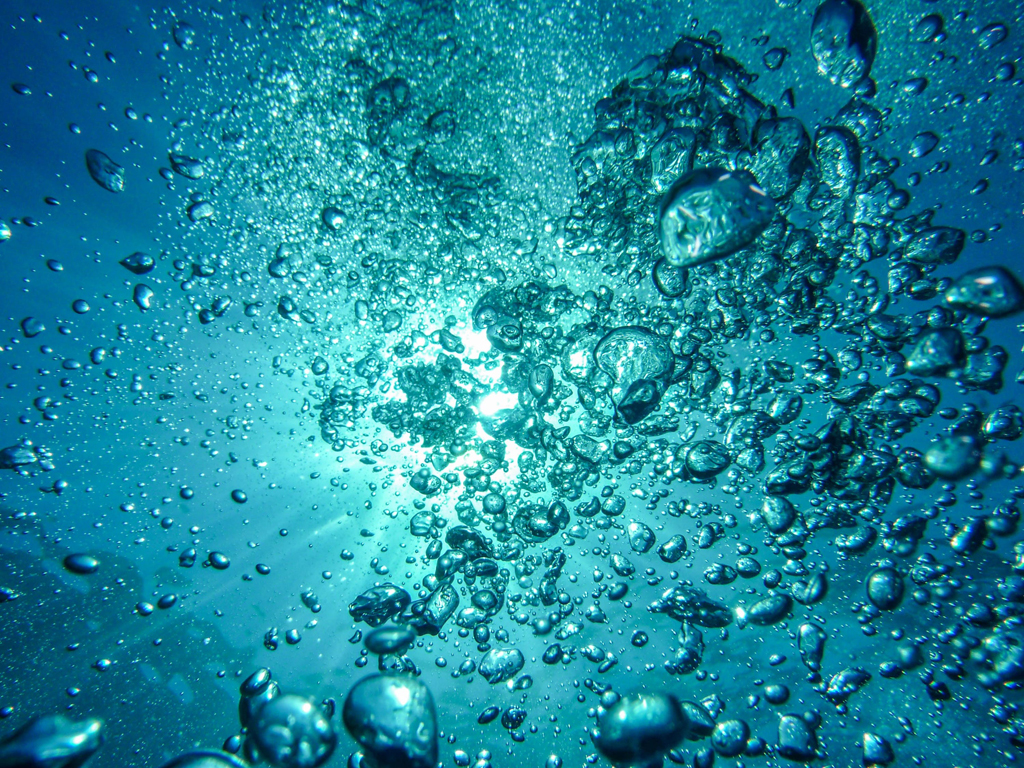
On the 22nd of March, Scotland celebrated World Water Day 2021, as part of a global UN initiative to understand the value of water to us all. But define value – it’s very subjective. Water, though, is so fundamental to all our existence it inherently draws together many perspectives on value, and these evolve as we know more about our most precious of resources.

Making up 70% of our world, it’s what justifies us as the Blue Planet, spinning in space. Without it there would be no life. It is the lifeblood of industry: 90% of the global economy and 75% of jobs depend on water to some extent. But it is in crisis through our accelerating lifestyles and attendant demands on its use and overuse, and also because of climate change. Indeed, in many ways it is the messenger of climate change - ninety percent of all natural disasters are water related and these increasingly impact on more and more people across the globe. In short, it’s time to change our relationship with water.
In a water-rich country like Scotland we tend to take it for granted. Turn on the tap and it’s there, aim to go for a walk and bucket loads fall from the sky. It’s beloved of taxi drivers nationwide. But that’s not true across the globe. The arrival of rain is cherished and welcomed in some countries and in others the overuse of a once abundant resource is placing increasing constraints on livelihoods and the escape from poverty. The quantity of water has not changed, indeed that has not changed since dinosaurs roamed the world, but that water is finite and under threat. In many situations it is the quality of water and its distribution in time and space that are the problem: too much here; too little there. It’s not a level playing field, and demand for water keeps rising as society’s demands grow and cities develop.
And not all water is equal. We have blue water in our rivers and lakes, green water being drawn up to support plant and crop growth, grey, brown and black water in our waste-streams. We drink tap water, mineral water, sparking water, well-water, distilled water and product manufacturers probably aim to market even more subtle “types of water”. It can come from different sources: raw water from the hills, brackish water, groundwater, rainwater or wastewater. But basically, it is still just H2O.
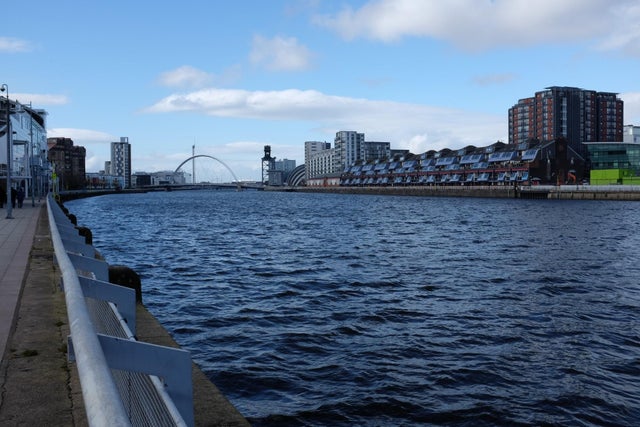
So why is this important? Simply because we depend for our survival on these different types of water that we put to different uses and all of which have different values. But again; define value. To many it’s the simple pounds, shillings, and pence of the water market. What does it cost to make it fit to drink or use and what does it cost to clean it up afterwards? Water, though, has value that transcends money. It has spiritual or religious significance. It has value for mental wellbeing; the mindfulness of hearing the patter of water on a roof, trickling in a burn or waves lapping on a beach; the moods of rainfall, rainbows and cascades; the feel of it on our skin. What value do we place on those attributes, and how do we assess them against the hard economic costs? That’s the challenge.
Our waste streams, historically the polluter of many of our country’s beautiful rivers are now highly valued for their embedded nutrients, metals and energy, all of which can be recovered and reused. Scottish Water has a new, world-leading target of attaining net-zero by 2040. Our new approaches to protecting cities from floods based on wider ecologically-based measures provide value not only in their primary function, but also because they provide prized ‘blue-green’ recreational spaces, important corridors for wildlife and settings for desirable and usually expensive real estate.
Our relationship with water is changing and must continue to change. Truly valuing water means giving it appropriate recognition, promoting efficiency and balancing short-term need against longer-term sustainability. Thinking about our legacy to others.
For more information visit CREW website and James Hutton Institute website.
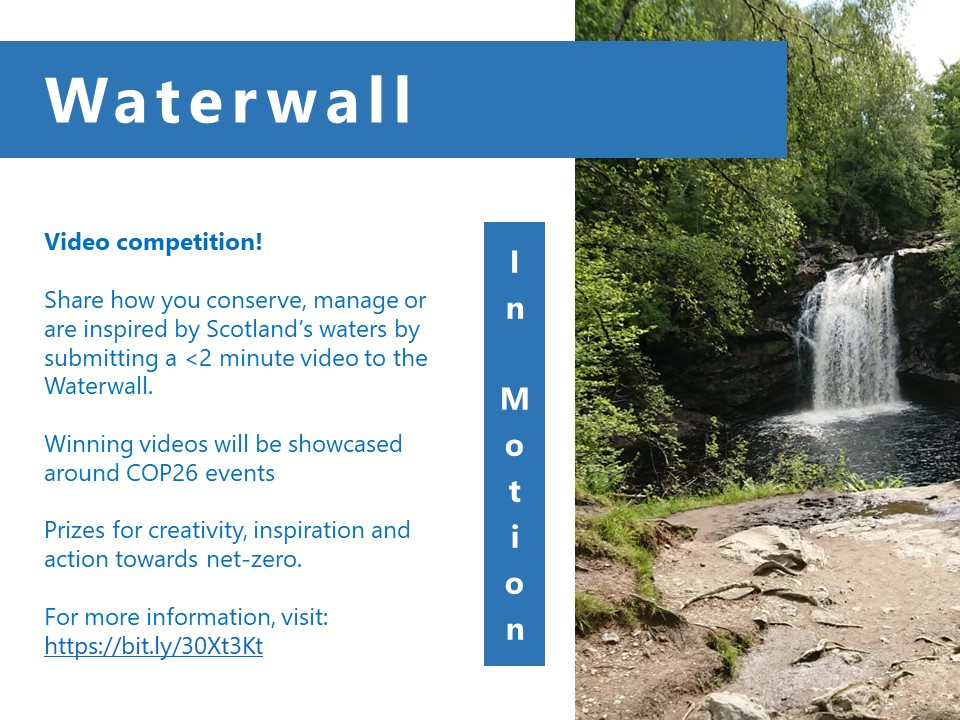
Working in partnership with the Scottish water community, CREW has developed the WaterWall in Motion – a project that promises to be a fantastic video resource and competition to celebrate Scotland’s relationship with water, and its Hydro Nation ambition. The aim is to celebrate how Scotland is leading the way in water research, innovation, management, business, creativity, health, art and recreation.
The project is open to the public and any organisation, business or individual working to monitor, research, innovate, manage, regulate, conserve or simply enjoy and value Scotland’s water resources. The existing WaterWall, developed at the James Hutton Institute, has been enhanced to accommodate videos and the water community is invited to post links to 2-minute videos on one of eight themes
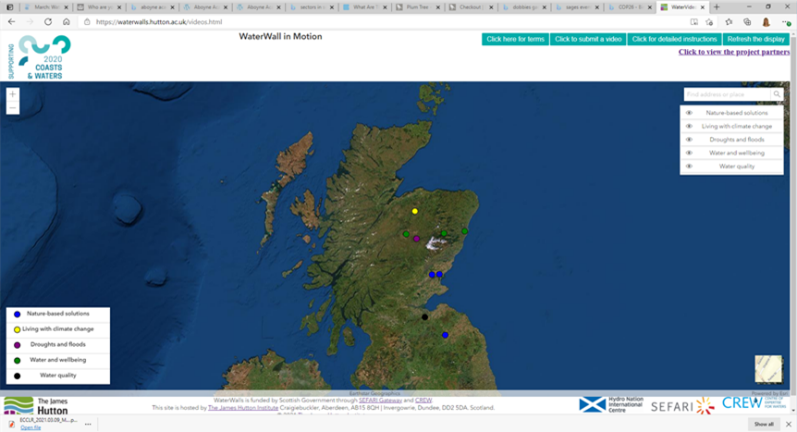
- Nature-based solutions
- Droughts and floods
- Water quality
- Living with climate change
- Freshwater restoration
- Innovation in the water sector
- Water and wellbeing
- Water inspired creativity
Prizes will be awarded across categories for innovation, creativity, originality; actions for achieving net zero carbon emissions and most impactful (evocative, celebratory or inspirational video).
This project aims to showcase and raise the profile of Scotland as the Hydro Nation at COP26 and satellite events, as well as to provide a point of reference for the water community to aid in the development of new networks and opportunities in the water sector. The WaterWall in Motion project was launched at World Water Day 2021 on the 22nd of March and the competition will run until the 13th August 2021.
For more information click here.
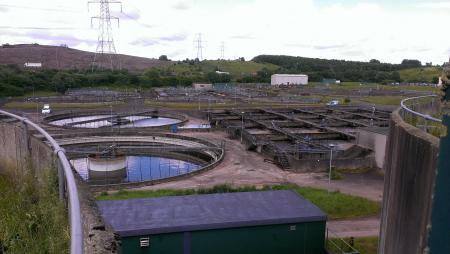
CREW funded project to test waste water for signs of Covid-19 to help pinpoint local spikes of the virus.
On request from Scottish Water, the Centre of Expertise for Water (CREW) funded a pilot project that aims to determine whether SARS-CoV-2 viral RNA can be detected in municipal wastewater from Scottish communities and whether the detection of SARS-CoV-2 viral RNA in municipal wastewater has the potential to be used to track community infection. Dr Alex Corbishley led the research from the University of Edinburgh's Roslin Institute and CREW engaged the Scottish Environment Protection Agency (SEPA) to ensure that the methods developed could ultimately be adopted by SEPA as part of their national (Scottish) programme of surveillance and analysis. CREW invited experts such as Dr Michael Gormley (Heriot Watt University) to join the project Steering Group and informed the Scottish Government of key developments to ensure project outcomes are shared widely.
CREW funding and coordination allowed for a rapid response to the research need to develop an assay to help tracking SARS-CoV-2 via municipal wastewater. The CREW project team used this opportunity to develop networks (and funding proposals) within the UK and internationally to work collaboratively towards finding a solution to this complex issue.
Dr Alexander Corbishley of the University of Edinburgh’s Roslin Institute, said:
“Detecting viral genetic material in waste water is relatively easy, however the challenge is measuring how much genetic material is present accurately and relating that to disease levels in the community. The support from CREW has allowed us to use our expertise in disease monitoring to inform SEPA and Scottish Water’s efforts to develop a Scottish wastewater monitoring programme”.
See BBC Scotland coverage here: https://www.bbc.co.uk/news/uk-scotland-53109139
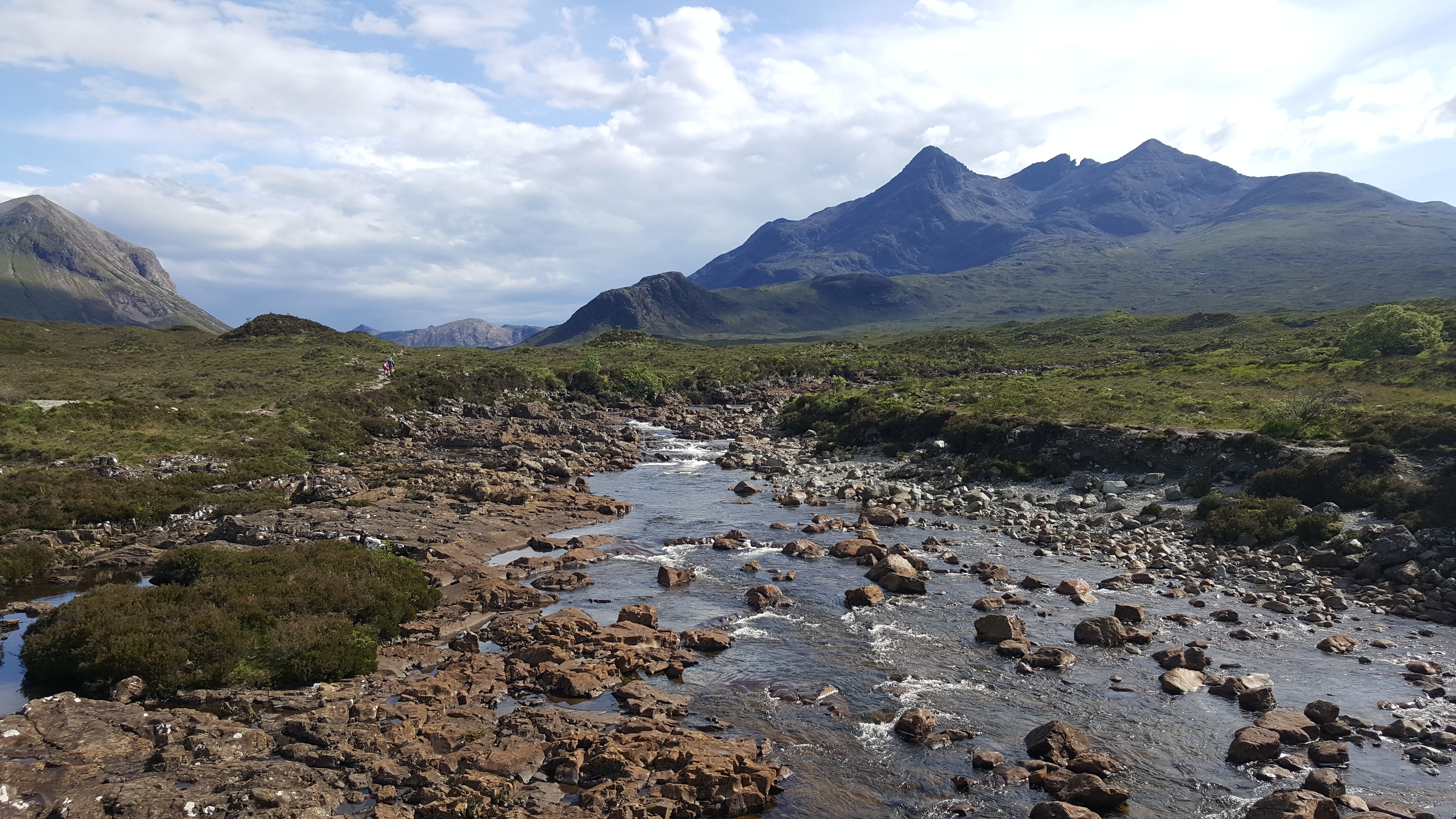
The latest UK climate projections show a trend towards drier and warmer summers, with the west of Scotland set to become wetter and the east drier, plus more frequent instances of heavy rainfall. New research by the James Hutton Institute shows that these changing weather patterns are likely to make private water supplies across Scotland more vulnerable to droughts, a major issue considering that private supplies provide drinking water to 4% of Scotland’s population, and to many more through businesses and tourist facilities.
Summer 2018 was unusually dry and warm and many private water supplies ran dry leaving people needing assistance from their local authority. Scotland’s Centre of Expertise for Waters (CREW) responded on behalf of the Scottish Government by commissioning a report into how climate change is likely to impact the resilience of private water supplies in the future, focusing on water scarcity. If, as projected, drier and warmer summers are more frequent, private water supplies will be increasingly vulnerable to water shortages. North East Scotland is forecast to experience the largest increase in water shortages, and it is also where there is the highest density of private water supplies.
